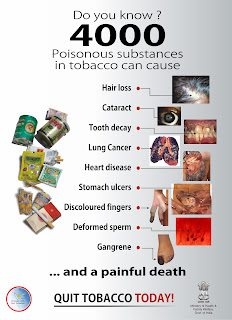Trinity Care Foundation is an Organization involved in School Health , Public Health Dentistry Programs , Rural Health Camps and other Public Health Programs.
■Among young people, the short-term health consequences of smoking include respiratory and non respiratory effects, addiction to nicotine, and the associated risk of other drug use. Long-term health consequences of youth smoking are reinforced by the fact that most young people who smoke regularly continue to smoke throughout adulthood.(1) Cigarette smokers have a lower level of lung function than those persons who have never smoked.(1) Smoking reduces the rate of lung growth.(1)
■In adults, cigarette smoking causes heart disease and stroke. Studies have shown that early signs of these diseases can be found in adolescents who smoke.(1)
Tobacco Awareness Programs in Colleges by Trinity Care Foundation , Website Link
■Smoking hurts young people's physical fitness in terms of both performance and endurance—even among young people trained in competitive running.(1) On average, someone who smokes a pack or more of cigarettes each day lives 7 years less than someone who never smoked.(2)
■The resting heart rates of young adult smokers are two to three beats per minute faster than nonsmokers.(1)
■Smoking at an early age increases the risk of lung cancer. For most smoking-related cancers, the risk rises as the individual continues to smoke.(1)
Tobacoo Awareness Program in Colleges, India
■Teenage smokers suffer from shortness of breath almost three times as often as teens who don't smoke, and produce phlegm more than twice as often as teens who don't smoke.(3)
■Teenage smokers are more likely to have seen a doctor or other health professionals for an emotional or psychological complaint.(3)
Tobacco Awareness Program Link.
■Teens who smoke are three times more likely than nonsmokers to use alcohol, eight times more likely to use marijuana, and 22 times more likely to use cocaine. Smoking is associated with a host of other risky behaviors, such as fighting and engaging in unprotected sex.(1)
Trinity Care Foundation is a Non Governmental Organization focusing on Craniofacial Deformities, School Health and Outreach Programs in Karnataka, India. Trinity Care Foundation requires your Support to implement these Community Health Programs in Government Schools in Ramanagara, Kolar and Bangalore Rural Districts. Kindly Contact us.. Email: support@trinitycarefoundation.org
References
1.CDC, Preventing Tobacco Use Among Young People—A Report of the Surgeon General, 1994
2. Lew EA, Garfinkel L. Differences in Mortality and Longevity by Sex, Smoking Habits and Health Status, Society of Actuaries Transactions, 1987.
3. AJHP, Arday DR, Giovino GA, Schulman J, Nelson DE, Mowery P, Samet JM, et al. Cigarette smoking and self-reported health problems among U.S. high school seniors, 1982-1989, p. 111-116.
■Among young people, the short-term health consequences of smoking include respiratory and non respiratory effects, addiction to nicotine, and the associated risk of other drug use. Long-term health consequences of youth smoking are reinforced by the fact that most young people who smoke regularly continue to smoke throughout adulthood.(1) Cigarette smokers have a lower level of lung function than those persons who have never smoked.(1) Smoking reduces the rate of lung growth.(1)
■In adults, cigarette smoking causes heart disease and stroke. Studies have shown that early signs of these diseases can be found in adolescents who smoke.(1)
Tobacco Awareness Programs in Colleges by Trinity Care Foundation , Website Link
■Smoking hurts young people's physical fitness in terms of both performance and endurance—even among young people trained in competitive running.(1) On average, someone who smokes a pack or more of cigarettes each day lives 7 years less than someone who never smoked.(2)
■The resting heart rates of young adult smokers are two to three beats per minute faster than nonsmokers.(1)
■Smoking at an early age increases the risk of lung cancer. For most smoking-related cancers, the risk rises as the individual continues to smoke.(1)
 |
| Health Education |
■Teenage smokers suffer from shortness of breath almost three times as often as teens who don't smoke, and produce phlegm more than twice as often as teens who don't smoke.(3)
■Teenage smokers are more likely to have seen a doctor or other health professionals for an emotional or psychological complaint.(3)
Tobacco Awareness Program Link.
■Teens who smoke are three times more likely than nonsmokers to use alcohol, eight times more likely to use marijuana, and 22 times more likely to use cocaine. Smoking is associated with a host of other risky behaviors, such as fighting and engaging in unprotected sex.(1)
Trinity Care Foundation is a Non Governmental Organization focusing on Craniofacial Deformities, School Health and Outreach Programs in Karnataka, India. Trinity Care Foundation requires your Support to implement these Community Health Programs in Government Schools in Ramanagara, Kolar and Bangalore Rural Districts. Kindly Contact us.. Email: support@trinitycarefoundation.org
References
1.CDC, Preventing Tobacco Use Among Young People—A Report of the Surgeon General, 1994
2. Lew EA, Garfinkel L. Differences in Mortality and Longevity by Sex, Smoking Habits and Health Status, Society of Actuaries Transactions, 1987.
3. AJHP, Arday DR, Giovino GA, Schulman J, Nelson DE, Mowery P, Samet JM, et al. Cigarette smoking and self-reported health problems among U.S. high school seniors, 1982-1989, p. 111-116.


No comments:
Post a Comment